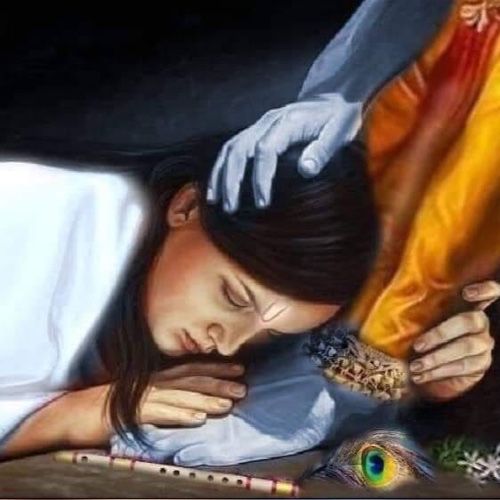Bhagwat Session 7
Pls find below the Synopsis. It has been decided into;
-Some conversations
-Story
-Revisit some definition
-Points to ponder
Shrimad Bhagavata Mahapurana
Synopsis of the Seventh Session
Bhagavata Pratham Skanda (Book One)
Chapter 16 to 19
———————————————————
Parsiksit to Sukhdevji
King Pariksit asks here the following two questions;
1. What should be done under all circumstances by a man who is under the verge of death?
2. What should be done by man in general - What should a mortal do at all times and under all circumstances?
- What should they hear?
- What should they repeat?
- What should they keep in their mind?
- What should they resort to?
- What should they avoid?
It is these two questions that have been answered in length in the course of the eleven books of ‘Shrimad Bhagavata Mahapuran’.
————————————————————
Shaunaka to Sutadevji
Pray, narrate to us that most sacred wisdom imparted to Pariksit, which lays bare the truth in unambiguous terms.
Sutadevji to Shaunaka
O Sages, that shine like the sun, what you have asked me in this assembly, I shall tell you according to my own light. Winged creatures sour according to their own capacity, so do the learned recount the pastime of the all pervading Lord according to their own understanding.
———————————————————
Story
The story so goes, that Sage Sukhdevji was sitting and meditating on the Self, that infinite self that dwell alike in all. When Veda Vyasa approached him, seeing his son immersed in a state of bliss, he sat down beside him, and started singing the glories of God, he started describing him in words and eulogising his timeless tales.
Hearing these, Sukhdevji opened his eyes, which were filled with tears divine ecstasy, and he said, why was I sitting and meditating on the divine without a form, when the same divine can be seen, touched, felt, with these mortal means. So beautiful is the Leela of the Lord. He requested his father to narrate the entire Shrimad Bhagavata Mahapurana to him, and started drinking the nectar like ‘Saakar’ Stories of that same beloved ‘Nirakar’ he was meditating on.
—————————————————
Lets bring ourselves back to Namisharanya, where there is this Yagna being carried out by Shaunakji and Sutadev Goswami is sitting at the Vyasa Aasan. He has just completed telling us how the panadavas and Lord Krishna dropped their mortal forms, leaving the throne to Pariksit.
Pariksit was a just ruler, under his rule the mother earth was taken care of, but slowly and steadily he realised that kaliyug was setting in. He went in a search to fight and conquer Kaliyug. In the process, the entire earth became a part of his just rule.
One day on his way, he saw a very astonishing thing, he saw a White Bull and a Cow talking to each other, in fact, the cow was crying and the bull was struggling to balance itself on only one leg. In the middle of their conversation came a kingly looking man, who started hitting the bull and trying to break its only leg. The helpless bull and cow, were crying piteously.
Pariksit could not take this torture, and he rushed to save the innocent animals. He rushed towards the man, and was about to kill it, when this man took refuge in Pariksit. On enquiring he found out that this man was no other than Kaliyug, and the Bull was no other than Dharma and the Cow was Mother earth.
Kaliyug was on a mission to rob everyone of their own dharma, he was breaking the very foundation on which Dharma stands Tapas, Sochya, Daya and Satya. He had already broken the first three, and was not hellbent on breaking the one leg of satya as well. Seeing all this happening on her, mother earth was crying. Seeing the virtues vanish, and vices take charge, she vailed.
Pariksit, though wanted to destroy kaliyug, but gave it a chance to live, outside his kingdom. However, there was no place where his kingdom did not exist. So Pariksit gave him 4 places within his kingdom to live in;
- Gambling (falsehood)
- Alcohol (Intoxication)
- brothel houses (Passion)
- Shambles (Cruelty)
Kaliyug revolted, saying none of these exist in your kingdom. To which, Pariksit gave him a fifth place;
- Gold (Rajas)
Assuring Dharm and Mother Earth of their safely, he went aways to his palace. There, one day, he happened to go to the treasury and was seeing what all his ancestors had left, and he came across this grand crown and he put it on. This crown happened to belong to ‘Jarasandha’. He put on this crown, immediately kali came and sat on it.
Pariksit, went out on a hunt alone, got lost on the way, thirsty, tired and broken, he reached a hut. Where Samika muni was meditating. He seeked hospitality, but when none was offered, in anger he put a dead snake around the Sage’s neck and walked away. When Shringi, the son of Samika saw this, he cursed Pariksit to be killed by Taksaka (the king of snakes), at the end of 7 days.
Samika rebuked his son for cursing a righteous king, and asked him to do more tapasya to control his mind. He in turn informed Pariksit of his impending end. That very moment Pariksit dropped all his attachements, crowned Janamejaya his eldest son, the King. Then he went and sat down at he bank of Ganga and decided to fast onto death.
All the sages descended to bless him, and he seeked answers to a few questions. They all had many thing to say, but, none went and took the Vyasa Aasan, that had been laid out. Then came Sukhdevji, dressed with the brilliance of his divine love, all the great sage and even his own father, bowed down to him. He without asking or being told went and sat down on the Vyasa Aasan, and began the beautiful narration.
Revisit some Definitions
Dharm
We can say righteousness. But, the full meaning of this word can not be described in English. Dharm is Dharm.
For instance,
What is the Dharm of Sugar?
The Dharma of sugar is to be sweet. No matter what you put it in. It does not leave its Dharm of being sweet, and sweetens the most bitter of things.
In the same way, we also have a Dharm. Our dharma is to every be in our Sat Chit Anand Swaroop.
“Sat-Chit-Ananda is a Sanskrit term and refers to the nature of the core of our Being or Self. Sat means Existence/truth. Chit means Consciousness. Ananda means Bliss.
Another way to look at it would be, we are nothing but eternal bliss and Love. My Dharm is to spread the same, for one can only give what one has, and we have nothing but, ‘Bliss and Love’ to share.
So my Dharm is Love and Bliss
Sochya (Purity)
“Cleanliness, not only outer cleanliness but also inner purity.”
External as well as Internal Purity is very essential. External purity is being clean externally. Keep the body and surroundings clean and uncluttered. In fact, whatever we intake should be pure. Pure thoughts, pure food, pure company etc.
For instance;
- Jesa kaho aan wesa hoga maan - feeding in purity
- Purity of interaction - interact with Positive people.
Internal purity is purity of thought word and deed. It is freedom from all the vices. Freedom from vicious thoughts. It is Purity of intentions. Purity of spoken words, which are truthful and at the same time sweet. Freedom from diplomacy and hypocrisy.
“Vani ek anmol hai,
Jo koi bole jani.
Hiye taraju tol kar,
fir mukh bahar aani.”
“Weigh every word in your heart, before it comes out of your lips.”
Tapas (Austerity)
“To bear anything and everything that comes across on the spiritual path and complete dedication to the spiritual practices.”
Tapas also means restraint of the senses and meditation. It leads to control of the mind. Austerities like occasional fasting and observance of silence increase the power of endurance.
Mental tapas is more powerful than physical tapas. To keep a balanced mind in all conditions of life, to bear insult, injury and persecutions, to be ever serene, contented and peaceful, to be cheerful in adverse conditions, to have fortitude in meeting danger, to have presence of mind and forbearance, are forms of mental tapas.
Daya (Compassion)
Daya = Compassion = Empathy + Action
Daya is grace, love and compassion. It is when we empathise with somebody, we are able to feel their pain and suffering. But, compassion does not end here. If it ends here, it is not compassion, it is merely pitying the person or situation.
Compassion when you see somebody in pain and do something about it.
Satya (Truthfulness)
Satya is truthfulness and honesty. One has to be truthful in thought, word and deed. Only than one is fully imbibed in Satya.
Many times we feel that a half lie, harmless lie, beneficial lie, is as good as truth. But, it is not.
Note: If the battle is between Truth and Lie, sooner or later the Truth will win. However, if the battle is between a “small lie’ and a ‘big lie’, The bigger lie will definitely come out victories.
Points to Ponder
Change Of Yuga
When Krishna left his Yadava form and disappeared, the Dwapar Yuga came to an end, Kali yuga sneaked in. Krishna is our true self, and the vices the age of Kaliyug.
Pariksit, is looking for Krishan and rejoicing when others sing his glories and tell him how loved he was, how precious he was for Krishna. He has forgotten that Krishan is within him, Krishan is him.
It is when one forgets ones own ’Sat Chitananda Swaroop’ that the vices take over and don’t let the truth shine from below its layers.
Kali Age
- It is every ready to take the unweary man by surprise. It is heroic in the midst of the ignorant and fickle minded, but is cowardly in front of the wise and strong minded.
- In this age, meritorious acts bear fruit immediately as soon as they have been projected.
- On the other hand, sinful acts, yield fruit only when they have been committed.
- In this age, simply singing the glories fo the the Lord can help us cross the ocean of mundane existence.
Pinacle of Dharm
When asked by King Pariksit to name the person who had wronged him, Dharma in the form of a Bull replied as follows;
‘Bewildered as we are by the conflicting statements of various, we know not the person who is responsible for the cause of suffering.
- Some who deny all difference, declare their own self as responsible for their suffering.
- Others attribute it to providence
- Others ascribe it to their own doings
- some say nature to be the cause of all sufferings
- yet some other say God as the bestower of suffering’
He did not mention any name or put any blame, he was beyond all this, he knew that not only the one who sins but also;
‘The one who does bad-mouthing (chugli) of an adharmi, is no different from the one who is living in adharma’.
Inheritance from our Ancestors
Can it be said to be only in tangible terms, of money and property, or it is more deep rooted than that, more intangible in nature, in the from of sanskars?
Can anyone claim to be a ‘Self-Made Man’, the word so commonly used, tattering the very emotion of love?
Can an amount be put on the love, care and sacrifice? can one become what one has become without the sanskars?
Ajatyam - Being Alert and Aware
Pariksit was the epitome of virtues, the divine promise who was protected by Shri Krishna himself. However, Kali caught on to him as well, altogether, only for a moment.
Hence, no matter how much one is established in Dharm, one should always be Ajat - Alert, forever in awareness and always extremely vigilant.
Shamik Muni
Shamik Muni, never felt that any wrong had been done to him by Pariksit. Only when one feel that one has been wronged, does one feel the need to forgive. He was beyond this, full of compassion, focused on the greater good and selfless love.
‘Kisse bandhu bare jagat mai,
koi nahin paraya.
Har manav mai partibim lekar
ushi bhram ki chaya.’
‘Holy men - In this world neither grieve, nor rejoice when they are subjected to contrary experiences by others, for the soul is ever beyond the three guns’.
‘Devotees of the Lord - even when reproached, deceived, abused, disregarded or struck by others, never return the wrong done by the wrong-doers, thought capable of doing so’.
Pariksit Blessed
‘When you Aspire,
The universe conspires.
When the student is ready,
The teacher appears.’
When he reached Ganga he is blessed with the company of all the great sages and above all Sukhdevji Muni.
‘A moments fellowship of the loving devotees of the Lord can not be compared to heavenly bliss or even final beatitude, much less the enjoyment sought after by mortal men.
Such sages bring sanctity to the whole world. Under the pretext of visiting holy places, the saints generally consecrate the places of pilgrimage themselves.’
Our Seven days of Life
Just like Pariksit had seven days of life, we too have no more. He is at least better placed as he knows, exactly when he will die.
We also have only 7 days, Monday, Tuesday, Wednesday, Thursday, Friday, Saturday and Sunday. On one of these seven days, we will also drop our mortal bodies. But, We don’t know when exactly.
We all every day are moving towards, that one truth, death.
He dropped all his worldly attachments and went on to seek the truth, the minute he realised his end was near.
‘Pariksit the wise who had developed love for God, shaked off in no time his deep rooted attachment to his body etc and entered the last stage of Paramhamsa, in which the practice of non-violence and control of the senses becomes ones sacred duty.’
‘The truth about ones impending death can speedily arouse dispassion in even him who is deeply attached to the world.’
What about us?
What are we doing?
Where are we heading?
What are we seeking?
Does the talk of death, not want you to seek the infinite and the imperishable nature of the soul, that you are?
So, that the drama around the mortal-self and the fear of impending death becomes insignificant?
Jai Shri Krishna🙏
Jai Shri Hanuman🙏


